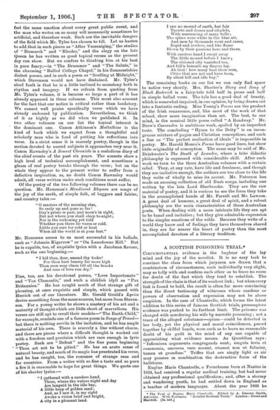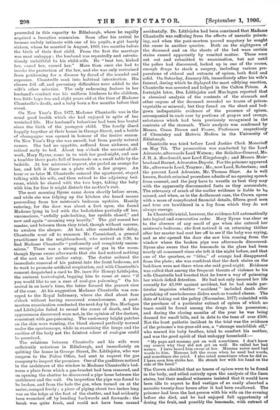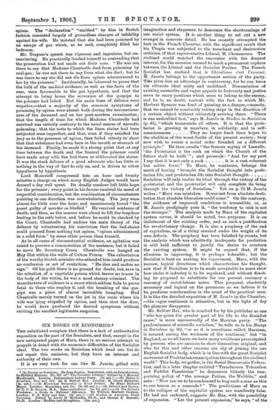A SCOTTISH POISONING TRIAL.*
CIRCUMSTANTIAL evidence is the bugbear of the lay mind and the joy of the novelist. It is no easy task to convince the class from which jurymen are drawn that a combination of circumstances, each individually very slight, may so tally with and confirm each other as to leave no room for doubt of the fact which they tend to establish. The strength of the chain is that of its weakest link ; but when every link is found to hold, the result is often far more convincing than the direct testimony of witnesses whose candour or powers of observation and expression may not be above suspicion. In the case of Chantrelle, which forms the latest addition to this series of famous Scottish trials, presumptive evidence was pushed to its furthest limit. The prisoner was charged with murdering his wife by narcotic poisoning ; not a trace of the alleged substance—opium—could be detected in her body, yet the physical and moral coincidences, pieced together by skilful hands, were such as to leave no reasonable doubt of his guilt in the mind of any one capable of appreciating what evidence means. As Quintilian says : " Infirmiora argumenta congreganda aunt; singula levia, et communia, umversa vero nocent, etiamsi non ut
tamen ut grandine." Trifles that are singly light as air may possess in combination the destructive force of the hailstorm.
Eugene Marie Chantrelle, a Frenchman born at Nantes in 1834, bad received a regular medical training, but had never obtained any professional qualification ; and, after a stormy and wandering youth, he had settled down in England as a teacher of modern languages. About the year 1866 he
• The Trial of Raging Marie Chanfrelle. Edited by A. Duncan Smith, Advocate. With Portraits. "Notable Scottish Trials." London Sweet and Maxwell. De. net.:i proceeded in this capacity to Edinburgh, where he rapidly acquired a lucrative connexion. Soon after his arrival he
became unduly intimate with one of his pupils, a girl barely sixteen, whom he married in August, 1868, two months before the birth of their first child. From the first the marriage was most unhappy ; the husband was repeatedly and ostenta- tiously unfaithful to his child-wife. He "beat her, kicked her, caned her, cursed her." More than once she had to invoke the protection of the law, and she was only restrained from petitioning for a divorce by dread of the scandal and exposure. Chantrelle sank into habitual intoxication. His classes fell off, and pecuniary difficulties were added to the wife's other miseries. The only redeeming feature in her husband's conduct was his uniform kindness to the children, two little boys ten and eight years old at the time of Madame Chantrelle's death, and a baby born a few months before that event.
On New Year's Eve, 1877, Madame Chantrelle was in the usual good health which she bad enjoyed in spite of her wretched life. Her husband's behaviour had been less brutal since the birth of the youngest child. The family dined happily together at their house in George Street, and a bottle of champagne was opened in honour of the festive season. On New Year's Day she was unwell, but from purely natural causes. She had no appetite, suffered from sickness, and retired early to bed. About ten o'clock the servant-of-all- work, Mary Byrne, came in to wish her good-night, and saw a tumbler three parts full of lemonade on a small table by the bedside. At her mistress's request, she peeled an orange for her, and left it there on a plate with a few grapes. An hour or so later M. Chantrelle entered the apartment, stayed talking with his wife, and then retired to the adjoining bed- room, which he shared with the two boys, taking the baby with him for fear it might disturb the mother's rest.
The next morning Byrne came down shortly before seven, and while she was tidying up the kitchen she beard moans proceeding from her mistress's bedroom upstairs. Hastily entering, for the door was about a foot open, she found Madame lying in bed with the bed-clothes partially off her, unconscious, "awfully pale-looking, her eyelids closed," and now and again "moaning very heavily." The girl roused her master, and between them they tried, though without success, to awaken the sleeper. At last, after considerable delay, Chantrelle went off to summon Mr. Carmichael, a general practitioner in the neighbourhood, who arrived at 8.30, to find Madame Chantrelle "profoundly and completely uncon- scious." There was a strong escape of gas in the room, though Byrne swore afterwards that she bad noticed nothing of the sort on her earlier entry. The doctor ordered the immediate removal of his patient into the front bedroom, set to work to promote artificial respiration, and with Chantrelle's consent despatched a card to Dr. (now Sir Henry) Littlejohn, the eminent toxicologist, begging him to come at once "if you would like to see a case of coal-gas poisoning." On his arrival in an hour's time, the latter formed the gravest view of the case. At his suggestion Madame Chantrelle was con- veyed to the Royal Infirmary, where she died about four o'clock without having recovered consciousness. A post- mortem examination conducted the next day by Drs. Maclagan and Littlejohn failed to reveal the cause of death, and the appearances discovered were not, in the opinion of the doctors, consistent with gas-poisoning. The customary bright patches on the skin were wanting, the blood showed perfectly normal under the spectroscope, while in examining the lungs and the cavities of the body not the faintest odour of coal-gas could be perceived.
The relations between Chantrelle and his wife were sufficiently notorious in Edinburgh, and immediately on quitting the house in George Street, Dr. Littlejohn, who was surgeon to the Police Office, had sent to request the gas company to inspect the premises. One of the gasfitters noticed in the architrave of the window in Madame Chantrelle's bed- room a place from which a gas-bracket had been removed, and on opening the shutter he discovered a pipe loose between the architrave and the wall. On inspection the pipe was found to be broken, and from the hole the gas, when turned on at the meter, escaped freely;' a piece of piping about two inches long was on the ledge at the foot of the shutter, and had evidently been wrenched off by bending backwards and forwards : the break was quite fresh, and could act have been caused
accidentally. Dr. Littlejohn had been' convinced that Madame Chantrelle was suffering from the effects of narcotic poison- ing, and when the post-mortem preyed nugatory he Sought
the cause in another quarter. Both' on the nightgown of the deceased and on the sheets of the bed were certain
stains caused apparently by vomited matter. These were cut out and submitted to • examination, but not until the police had discovered, locked up in one of the-rooms; enough drugs to stock a surgery, including various pre- parations of chloral and extracts of opium, both fluid' and solid. On Saturday, January 5th, immediately after his 'wife's funeral, during which he diplayed the most edifying -emotion, Chantrelle was arrested and lodged in the Calton Prison. A fortnight later, Drs. Littlejohn 'and Mac lag,an reported that a chemical analysis of the contents of the stomach and other organs of the deceased revealed no traces of poison, vegetable or mineral; but they found on the sheet and' bed- gown indisputable evidence of the presence of opium, accompanied in each case by portions of grapes and orange, substances which had been previously recognised in the' contents of the stomach. Their analysis was confirmed by
Messrs. Crum Brown and Fraser, Professors respectively of Chemistry and Materia Modica in the University of Edinburgh.
Chantrelle was tried before Lord Justice Clerk Monciieff on May 7th. The prosecution was conducted by the Lord Advocate, afterwards Lord Watson; the Solicitor-General, Mr. J. H. A. Macdonald, now Lord ICingsburgh ; and Messrs. Muir- bead and Burnet, Advocates-Depute. For the prisoner appeared Mr., afterwards Lord, Traynor; Mr., now Lord, Robertson; and the present Lord Advocate, Mr. Thomas Shaw. As is well known, Scotch criminal procedure admits of no opening speech from counsel, and the jury have to wrestle as best they may- with the apparently disconnected facts as they accumulate. The relevancy of much of the earlier evidence is 'liable to be missed, and when, as in the Ardlamont case, the Crown opens with a mass of complicated financial details, fifteen good men and true are bewildered in a fog from which they do not always emerge.
In Chantrelle's trial, however, the evidence fell automatically into logical and consecutive order. Mary Byrne was clear as to the absence of any smell of gas when she entered her mistress's bedroom ; she first noticed it on returning thither after her master had sent her off to see if the baby was crying, and as she opened the door she saw him coming from the window where the broken pipe was afterwards discovered.
Byrne also swore that the lemonade in the glass had been nearly all consumed since she left it the night before, and that one of the quarters, or " liths," of orange had disappeared from the plate; she was confident that the dark stains on the bed-linen were not there when she said good-night. Evidence was called that among the frequent threats of violence to his wife Chantrelle had boasted that. he knew a way of poisoning her which defied detection. He had not only insured her life recently for 21,000 against accident, but he bad made par- ticular inquiries whether " accident " included death after partaking of unwholesome dishes such as toasted cheese. The date of taking out the policy (November, 1877) coincided with the purchase of a particular extract of opium of Which no trace could be found among the drugs in his possession; and during the closing months of the year he was being dunned for small bills, and in debt to the tune of over BM. Not the least pathetic incident in the trial was the evidence of the prisoner's ten-year-old son, a "strange unchildish elf," who nursed his baby brother, tried to comfort his mother, and was the good spirit of that unhappy household :— .
"My papa and mamma got on well sometimes. I don't know any reason why they did not get on well. He called her bad names. I have heard him swear at her. Mamma never used bad words to him. Mamma* left the room when he used bad words, and sometimes she cried. I also cried sometimes when he did so. I have seen him strike her. He struck her with his hand on the side of the head."
The Crown admitted that no traces of opium were to be found in the body, and relied entirely upon the analysis of the linen stains, but their medical witnesses insisted that it would have been idle to expect to find vestiges of so easily absorbed a narcotic twenty-four hours after it had been swallowed. The prisoner had been the last person with his wife on the evening before she died, and he bad enjoyed full opportunity of dosing the fruit, and possibly the lemonade, with extract of
opium. The "declaration" "emitted" by him in Scotch fashion consisted largely of groundless charges of infidelity against his wife. He insisted that she had been poisoned by an escape of gas which, so he said, completely filled her bedroom.
Mr. Trayner's speech was vigorous and ingenious, but un- convincing. He practically limited himself to contending that the prosecution had not made out their case. "He was not there to say that Madame Chantrelle died from poisoning by coal-gas ; he was not there to say from what she died ; but he was there to say she did not die from opium administered to her by the prisoner." Incidentally, he laboured to prove that the bulk of the medical evidence, as well as the facts of the case, were favourable to the gas hypothesis, and that the attempt to bring home the severance of the gaspipe to the prisoner had failed. But his main lines of defence were negative,—that a majority of the common symptoms of poisoning by opium were absent both during the unconscious- ness of the deceased and on her post-mortem examination ; that the length of time for which Madame Chantrelle had survived was entirely contrary to the usual course of narcotic poisoning; that the tests to which the linen stains had been subjected were imperfect, and that, even if they satisfied the jury as to the presence of opium, they failed utterly to show that that substance had even been in the mouth or stomach of the deceased. Finally, he made it a strong point that at any time between the death and the funeral the prisoner could have made away with the bed-linen or obliterated the stains. It was the stock defence of a good advocate who has little or nothing in the way of fact to rely on, and is driven to rebut hypothesis by hypothesis.
Lord Moncrieff compressed into an hour and twenty minutes a charge on which many English Judges would have deemed a day well spent. Its deadly candour left little hope for the prisoner; every point in his favour received its meed of respectful consideration, but the combination of circumstances pointing in one direction was overwhelming. The jury were absent for little over the hour, and unanimously found "the panel guilty of murder as libelled." He received sentence of death, and then, as the macers were about to lift the trapdoor leading to the cells below, and before he could be checked by the Court, Chantrelle had undone the main theory of the defence by volunteering his conviction that the bed-stains could proceed from nothing but opium, "opium administered in a solid form" by some other person than himself.
As in all cases of circumstantial evidence, an agitation was raised to procure a commutation of the sentence, but it failed to move Mr. Secretary Cross. Chantrelle was hanged on May 31st within the walls of Calton Prison. The exhortation of the worthy Scotch minister who attended him could produce no confession or act of contrition. "He dies and makes no sign." Of his guilt there is no ground for doubt, but, save in the selection of a vegetable poison which leaves no traces in the body of the victim, he was a most clumsy criminal. The manufacture of evidence is a snare which seldom fails to prove fatal to those who employ it, and the breaking of the gas. pipe was a piece of almost incredible bungling. Had Chantrelle merely turned on the jet in the room where his wife was lying stupefied by opium, and then shut the door, he would have produced the desired symptoms without exciting the smallest legitimate suspicion. .




































 Previous page
Previous page